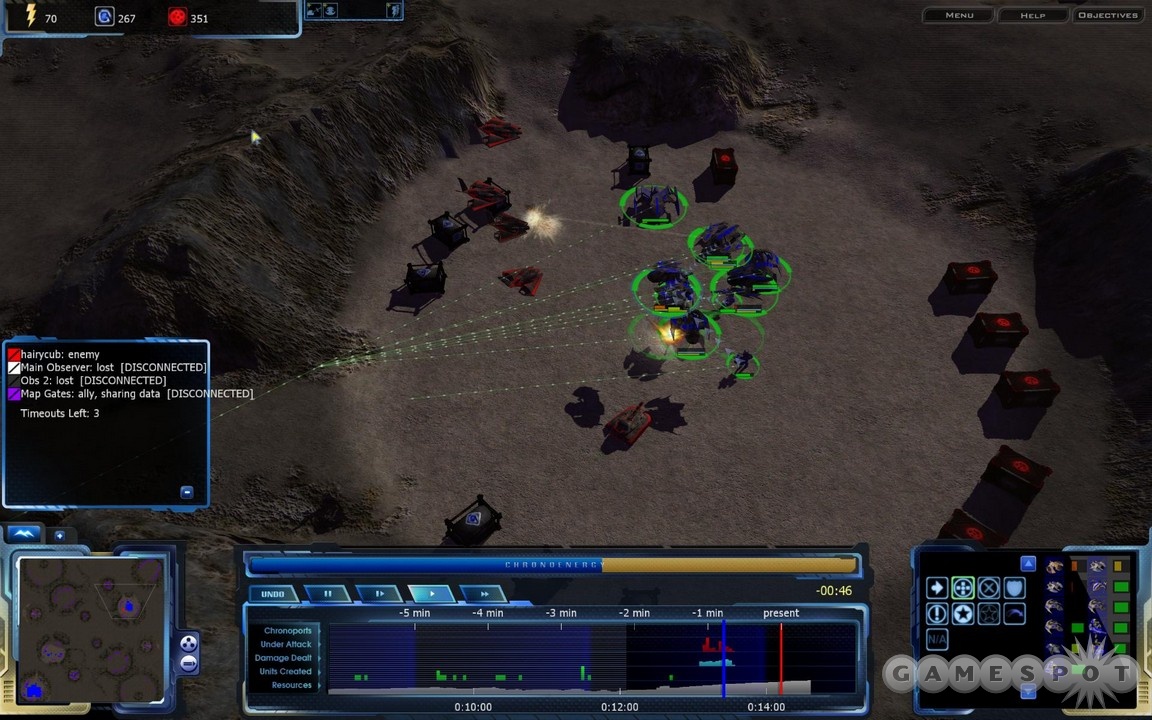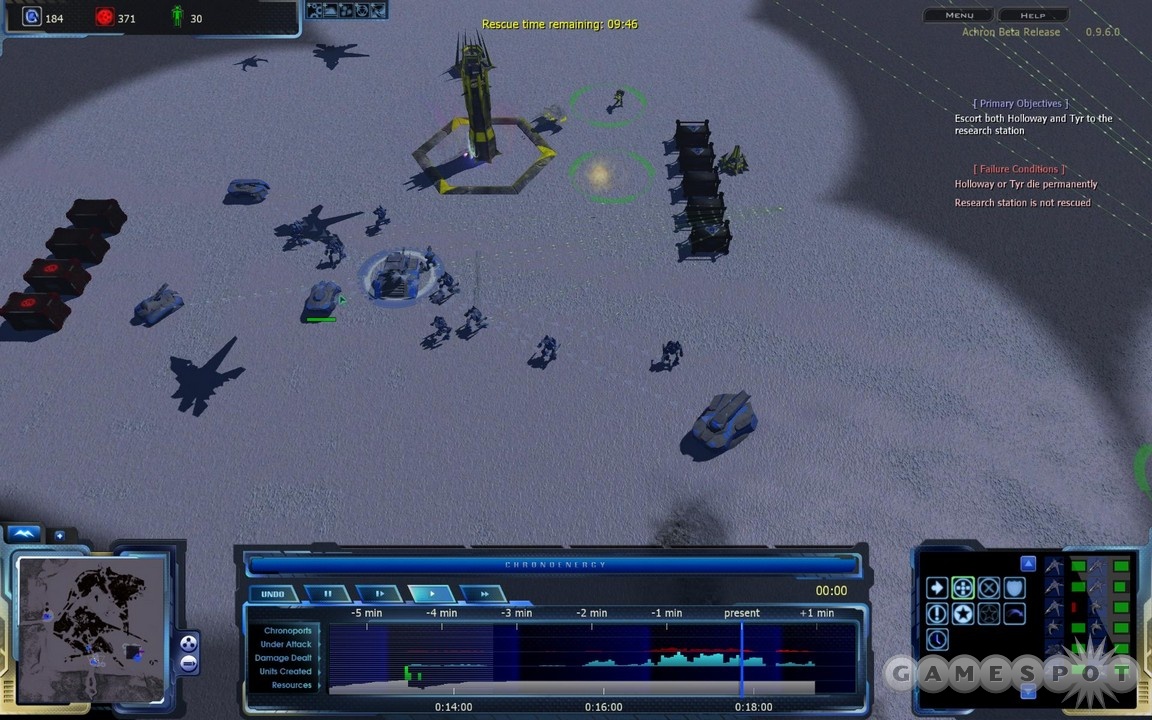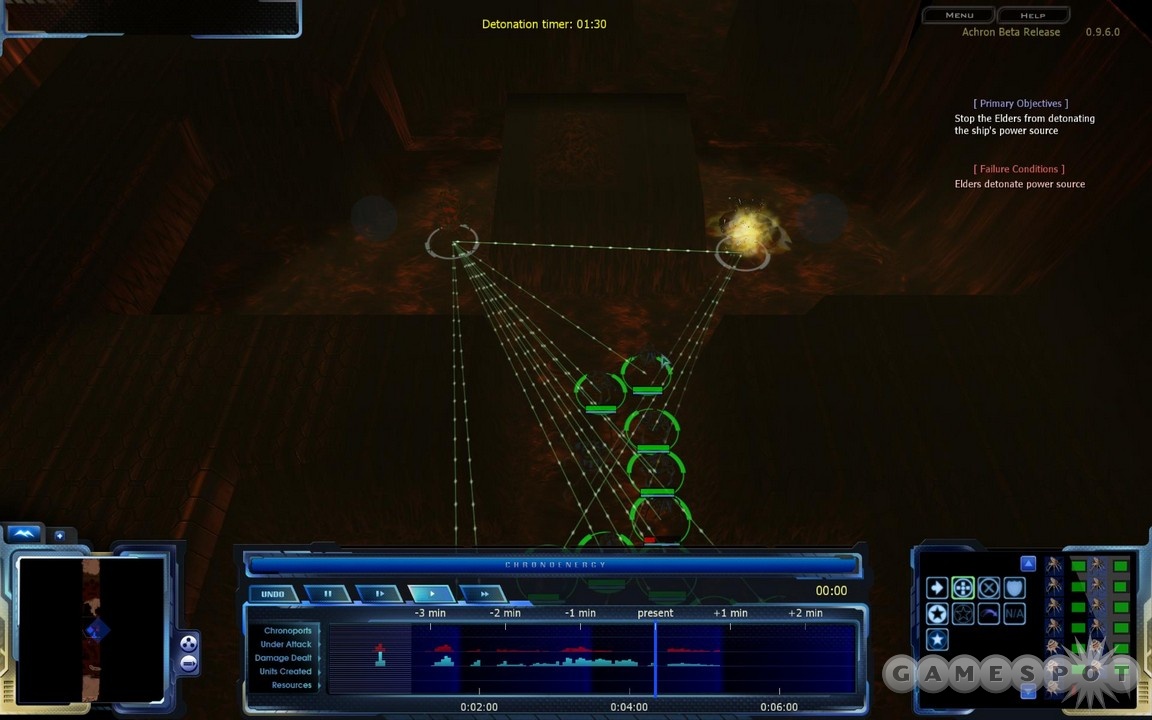Have you ever really sat down and tried to make sense of time travel logistics? The more you try to make sense of the inevitable paradoxes that arise, the more your brain threatens to turn to jelly. Developer Hazardous Entertainment has tackled the problem--and come up with some creative solutions--with its real-time strategy game Achron. In Achron, time is fluid; you can issue orders to your units not just in the present, but also in the past and in the future. The time travel mechanics add an intriguing strategic dimension to the standard RTS formula and lead to some occasionally mind-blowing moments. It's a pity that Achron's fundamentals don't do justice to its innovations. The pathfinding is terrible, leading to uncomfortable micromanagement just so you can get a single unit around a rock. And Achron is just plain ugly, which isn't only an aesthetic concern: many of the unattractive units look so similar, you can't differentiate one from another. If you hunger for inventiveness, you'll find it in Achron--a game that requires you to think outside of the usual three dimensions. But this budget-priced RTS is also a reminder that innovation needs the support of rock-solid fundamentals.
Achron's basics are those of a typical science-fiction strategy game. As one of three factions, you collect resources, research technology, build structures, and produce battle units in order to wipe your opponent off the map. But Achron adds a mind-boggling layer of time-traveling complexity to the mix, starting with the timeline that spans the bottom of your screen. Here, the events of the past, the present, and even the future are summarized--and your orders and grand strategic plans aren't limited to the present. By clicking somewhere on the timeline, you are immediately taken there, and your real-life present becomes the in-game past (or future). Mind you, this doesn't change the time in which your opponents might be strategizing. Each player works with his or her own personal timelines within this complex structure in which a portion of the past and a portion of the future are a single click away. But while you get access to view any portion of the ever-progressing timeline, you can't issue endless orders willy-nilly. Your ability to command units is limited by an energy bar; the further back you venture into the past, the less control you have over the proceedings.
At first, the whole concept is absolutely baffling. New players would do well to familiarize themselves with these mechanics in the campaign before venturing into multiplayer. But even then, you might need to replay a mission two or three times before you fully grasp what it's trying to teach you. Achron does an OK job of relaying the basics, but without ever showing you how it all fits together. So expect to struggle with the flexible chronology. But the "aha!" moments come, and when they do, they might make your mind explode. A simple scenario: Battle doesn't go the way you intend. And so you move back in time and issue a different set of orders. A more involved scenario: Confuse your opponent by skipping into the future and issuing orders, and then undoing them when that future turns into the present. Convolute events even further by using the chronoporter structure to send your robots into the immediate past, and watch as the current version of those robots and their past selves participate in the same skirmish. Thanks to time manipulation, you've just cloned an army.

You also must pay attention to the timewave that periodically washes across the screen, implementing all the changes made to the past so that they impact the present. And don't forget about other mechanics, such as teleporting and group hierarchies. Even after hours and hours of play, you'll see things that alternately blow your mind and make you wonder what the heck is happening, and how the heck you're supposed to stop it. Enemies appear out of nowhere. Skirmishes dissipate into an eerie peace. Annihilated structures spring back to life. Achron is for RTS veterans only--those who can conceive of time as a deep and dangerous ocean of calamity and conquest. And if you are such a veteran, the thrills are undeniable. Chrono-clone a fleet of airships and teleport them into your opponent's base. Watch with held breath as the chaos unfolds, even as you put new plans into motion. Despair as your opponent dips into the past to prepare for the future, and the timeline mops away your joy. You won't see anything like this in another strategy game--and it's exhilarating.
The differences among the three factions add even more variety to this brilliant confusion. The human faction is the most approachable, though they have their fun toys, such as a slingshot to propel units into other regions. The alien factions--the Grekim and the Vecgir--are more unusual. As the Vecgir, you produce pilots and, in turn, assign them to vehicles. When the vehicles are destroyed, you're still left with troops willing to fight to the death. Furthermore, these aliens come with the benefit of speed: with the proper upgrade, they can teleport without needing to be in range of a teleporter. Swooping about the map and forcing your opponent to wonder where and when your airships might emerge is a blast. The Grekim are all about self-replication. Troops and troop-producing structures are one and the same; planting two different units near each other (that is, activating their progeneration mode) lets them produce units of a different type. They are an adaptable race thanks to their ability to propagate almost anywhere, and many of their troops can chronoport without the use of a chronoporter.
Achron is at its best in multiplayer matches. There are a good number of maps, many of them built like traditional RTS skirmish maps, but a few are designed in interesting ways, using teleporters and chronoporters to test your time-manipulation capabilities. If you come to Achron for its single-player experience, the finer points won't be immediately obvious. In fact, you may be overwhelmed by the game's most troublesome element: broken pathfinding. In most strategy games, you can order your unit to go somewhere, and that is where it ends up. Not so in Achron. Ground units can't work out move orders that involve anything but flat, empty surfaces. They bump and slide against rocks and walls like flies against a window. They wander about aimlessly, unable to participate in battle because a confused alien is causing a traffic jam. Some campaign missions in which you have to funnel many units through narrow corridors are ridiculous showcases of your units' collective idiocy. This is some of the worst pathfinding you've seen in some time.

The single-player problems don't end there. The story is pretty involving and covers four campaigns and 35 missions. (Expect to spend a few dozen hours on it if you want to see it through.) Human and alien commanders battle and parlay, and sentient AIs are abusive and abused. The voice actors are clearly not professionals, but they're having a bit of fun in their roles, which makes it easy to forgive some lackluster line readings. It's too bad their lines are accompanied by drab, amateurish drawings without a hint of energy or style. At least they're consistent with the game's overall look, which could be described politely as "humble," even though "ugly" might be more apt. Plain, blobby units painted with broad strokes of flat color skitter across dreary tundras and deserts. Clashes don't erupt with fire and vibrant hues; instead, defeated units disappear in subdued displays of shrapnel. The sound effects provide a bit of "pew-pew" and "beep-beep," but they hardly capture the essence of planetary war. Gameplay trumps graphics, of course, but this is a case in which graphics are detrimental to the user experience. Troops are so bland and similar to each other that it can be difficult to tell one from another--a real issue when you need to make some split-second decisions for an individual unit. In some missions, units blend right into the backgrounds, which exacerbates the cumbersome micromanagement. It's too bad the visuals and sound effects didn't take their cues from the soundtrack: a collection of ambient tunes and dramatic riffs that provide color and contrast in an otherwise dingy game.
The campaign takes a long time to get exciting, which is just as well, considering you need to get used to the complexity of the time manipulation. But each mission is highly scripted, using time travel in very specific ways. Once you get used to the mechanics, you should probably be able to keep up with a bit of trial and error, at least until the final third of the campaign suite. At this point, missions become a lot more frustrating as you try to figure out what is happening, and what you must do to counteract it. Unfortunately, there are no difficulty levels--you just get what you get in terms of challenge. That's even true of skirmishes against the AI, which has only one difficulty level that can be best described as "uneducated." As long as you have a handle on the basics of your faction, you should have no trouble rolling over any computer-controlled opposition; you won't even need to manipulate time to prevail.

Pathfinding and AI are only two of the subpar essentials. Saved games don't always work the way you would imagine. Your place in the timeline may not be saved, your control groups might be unassigned, and the camera may start in the spot at which the mission begins, not the spot at which you saved. You could go back in time and trigger an old bit of dialogue--and then trigger new dialogue, causing overlap. (In that event, even the subtitles appear over the top of each other on the screen, resulting in gobbledygook.) And the game wrests control away from you for a bit of story exposition, yet lets the battle you were involved in continue without your input. And other RTS essentials you may have hoped for are strangely missing, such as an end-game breakdown of comparative statistics. Achron doesn't offer a slick and satisfying end-user experience.
What Achron does offer is a large amount of content featuring a truly new and extraordinary layer of strategy. It seems to be balanced well, though the time travel mechanics complicate traditional notions of RTS balance to the point where they may not even apply. It's a shame that this astonishing innovation isn't supported by the pathfinding, the AI, and the tight presentation it deserved. If you've got a few friends who fancy the idea of massaging time in the way an organist manipulates the keys, Achron could be your new online playground. Just be warned that this fancy time machine was built using rusty bolts, bent nails, and masking tape.